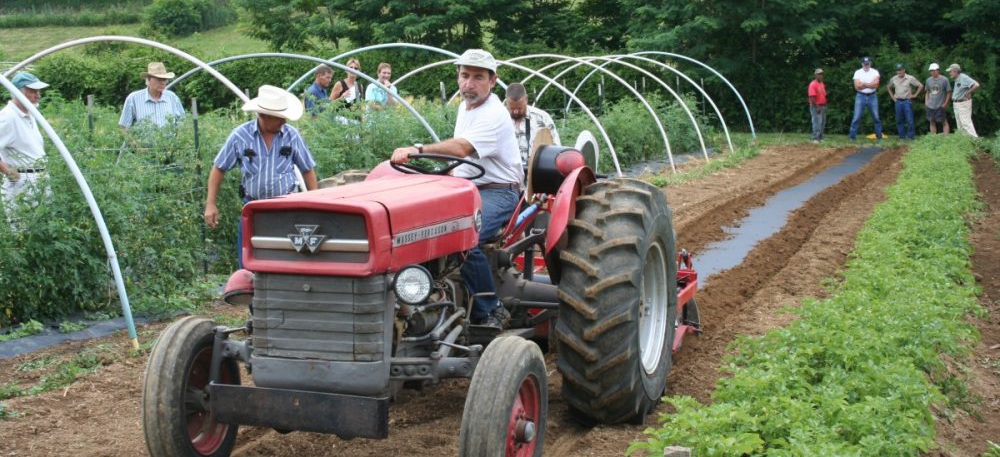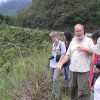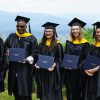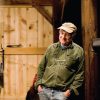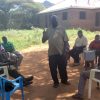Anthony Flaccavento didn’t just write the book on community-driven change—he’s practiced it for decades.
By Jesse Mintz
At most universities, economics courses are taught by professors with case studies in hand. At Future Generations University, students learn bottom-up economics from someone who draws on 40 years of experience.
Anthony Flaccavento has organized low-income southwest Virginia families to fight for access to housing, helped Appalachian tobacco farmers chart new territory with better paying organic crops, built sustainable local food systems in Oregon, and been arrested with striking coal miners demanding healthcare. He’s also an organic farmer that’s run for Congress.
A practitioner first, Flaccavento brings that experience and skill set into his classroom, enabling students to begin making a difference in their communities on day one.
“We have an impact on the world, whether we recognize it or not, just by being alive. Given that, we have a choice: we can try to be a part of the solution and the things that make a better world, or we can sit on the sidelines,” he explains of his guiding philosophy.
Flaccavento has never been one to sit on the sidelines. From Baltimore originally, he got a degree in Agriculture and Environmental Science from the University of Kentucky and went to the University of Pittsburgh for his graduate studies in rural economic development. With a mix of technical ability and a deep desire to give back, he always figured he’d work in developing countries but soon found himself called closer to home. His focus on rural community development took him to some of the most marginalized and deprived industrial and farming areas across the country.
That’s when he saw what we’re up against—a lesson that forms the backbone of his class at Future Generations University.
“You have to pick between jobs or trees, that was the dominant philosophy I saw across the country,” he explains of the choice offering development or environmentalism. But he also identified another way, a path to do better for workers, the community, and the environment—all while creating economic sustainability.
“My work has shown me that it’s far more than wishful thinking to imagine a radically better future. I’ve seen it emerging in many places,” he reflects. “Our task is to help it along.”
That task brought him to Future Generations University, first as a member of the Board of Trustees and now a faculty member. We caught up with him after his regular Wednesday morning class to find out how online teaching was going, what excites him about the future, and what students can hope to learn in bottom-up economics.
Future Generations: What attracted you to Future Generations University?
Anthony Flaccavento: It’s the only university I know of that’s truly bottom-up. Future Generations comes out of the experience of social change, of real-world action, of honing and improving the development process. They’ve built an academic framework to support, expand, and improve that effort to build a better world, but it fundamentally starts with real people and real problems. That’s pretty unusual. Most universities are trying, but struggle, to be relevant in the trenches. Future Generations is very bottom-up, building on decades of real-world experience. It’s incredibly exciting.
FG: You’re teaching ACC607, Bottom-Up Economics. How would you describe your class?
AF: The class equips students to build economies that work for people, the community, and the environment. That’s what bottom-up economics really is. We start with a critique of the dominant paradigm and the policies and practices that flow from that. Then we move onto dissecting the alternatives. And all the alternatives are woven into a coherent economic theory about the fundamental purpose of an economy, who it’s for, and how it functions to support people.
FG: What skills do students leave with?
AF: First, they get an intellectual framework. From there, it depends on what they’re trying to accomplish. I have a student in Vermont, for example, who is using a model of community development loan fund to organize people in a trailer park to buy the land they live on to resist a proposed development that would evict them. She needs to learn how to create wealth in communities that have not had access to wealth historically. And for her specific project, there are tools like grassroots financing, grant writing, and working with community development financial institutions.
FG: What makes for a successful student in this learning environment?
AF: The first thing is you have to be inquisitive. Being bold is an advantage when learning online so you have the confidence to express your opinions. And it absolutely helps students to have relevant experience.
FG: Tell us a bit about your classroom. With students from around the world, do they add to each other’s experiences?
AF: One-hundred percent yes. I have a range of experiences to share, but peer-to-peer sharing is often even more valuable. My class is around half American students. I’m starting to see a glimpse of how students are relating their personal experiences, from vastly different backgrounds. The other element of this is that the students here, on the whole, are more engaged. I’ve taught college classes before and had wonderful students. But here, many of them are mid-career professionals. Even the young folks have backgrounds doing good in their communities. They all have the experience to share and they’re finding it relevant to pull from each other.
FG: After 40 years of doing this, give us a glimpse into where you think we’re headed.
AF: I have high confidence that this work of building better economies, better communities, and better societies will continue to gain momentum in the U.S. and around the world. The class I’m teaching is just one tiny push for that to happen and I’m one tiny piece of a whole bunch of people trying to nurture this better world. I have high confidence—but the question is will it be soon enough, and will it be substantial enough to make a difference in a world that’s increasingly moving towards a gargantuan crash, ecologically, financially, and in terms of human relationships. That’s why I teach.
FG: What excites you about what lies ahead?
AF: I love teaching. I’ve had a great time assembling the syllabus, building the course, meeting the students. But what really excites me about Future Generations is the promise of a really hands-on approach to bottom-up economic development that can reach economic developers and help them think beyond their traditional model, and can reach activists who maybe lack a foundation in economics. That is a truly bottom-up strategy to make a transformative impact on the system.
*This interview has been edited for length and clarity
